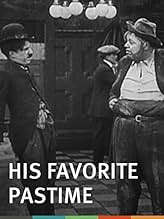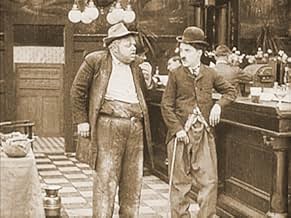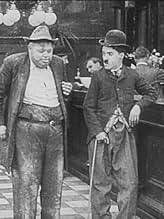PUNTUACIÓN EN IMDb
4,9/10
1,3 mil
TU PUNTUACIÓN
Añade un argumento en tu idiomaA very plastered fella follows a pretty woman home, and proceeds to make a nuisance of himself.A very plastered fella follows a pretty woman home, and proceeds to make a nuisance of himself.A very plastered fella follows a pretty woman home, and proceeds to make a nuisance of himself.
- Dirección
- Guión
- Reparto principal
Peggy Pearce
- Wife
- (as Velma Pearce)
Helen Carruthers
- Servant
- (sin acreditar)
Jess Dandy
- Minor Role
- (sin acreditar)
Hampton Del Ruth
- Drinker with Moustache
- (sin acreditar)
Billy Gilbert
- Shoeshine Boy
- (sin acreditar)
William Hauber
- Shoeshine Customer
- (sin acreditar)
- …
George Jeske
- Servant
- (sin acreditar)
Edgar Kennedy
- Tough Guy in Bar
- (sin acreditar)
Harry McCoy
- Bar Patron
- (sin acreditar)
Rube Miller
- Bar Patron
- (sin acreditar)
Reseñas destacadas
His Favorite Pastime (1914)
* 1/2 (out of 4)
Charles Chaplin plays the town drunk who walks into a local bar and starts throwing them down. Soon he can't walk straight but that doesn't stop him from getting on everyone's nerves. The annoying drunk had been done to death by 1914 and it had been done to death by Chaplin even though this was only his seventh movie. I'm really not sure what Chaplin thought of these films but this one here is pretty darn weak from start to finish with very few laughs. Once again we get to see Chaplin stumble around, pick fights and flirt with women who belong to other men. None of this is funny and what's worse is that it appears Chaplin is just sleepwalking through the film. You certainly can't blame here because I didn't see a single attempt at anything even trying to be funny. Roscoe 'Fatty' Arbuckle has a small role at the start of the film but just stumbles around as another drunk. Even if laughs could come from drunks, this one here features rather mean drunks, which again just isn't funny.
* 1/2 (out of 4)
Charles Chaplin plays the town drunk who walks into a local bar and starts throwing them down. Soon he can't walk straight but that doesn't stop him from getting on everyone's nerves. The annoying drunk had been done to death by 1914 and it had been done to death by Chaplin even though this was only his seventh movie. I'm really not sure what Chaplin thought of these films but this one here is pretty darn weak from start to finish with very few laughs. Once again we get to see Chaplin stumble around, pick fights and flirt with women who belong to other men. None of this is funny and what's worse is that it appears Chaplin is just sleepwalking through the film. You certainly can't blame here because I didn't see a single attempt at anything even trying to be funny. Roscoe 'Fatty' Arbuckle has a small role at the start of the film but just stumbles around as another drunk. Even if laughs could come from drunks, this one here features rather mean drunks, which again just isn't funny.
In another disappointing short comedy, Charlie Chaplin once again plays the standard, belligerent drunk, drinking himself into oblivion and then stumbling around this run-of-the-mill slapstick comedy. There are some mildly interesting items, such as the fact that the altogether unamusing but watchable opening scene features Chaplin and Keystone colleague Fatty Arbuckle as fellow drinkers in the pub, taking beers away from each other and gradually getting drunker and drunker, as well as the fact that this is one of the earliest, maybe even the origin, of one of Chaplin's gags that he would later perfect and use with great success, the lighting of the match on the seat of his pants. Other than that, there is not much else of note here.
The comedy of the film is really nonexistent, which is not to say that it is entirely bad, just a failed experiment. The obnoxious drunk has long since lost its appeal, if it ever had any, and I imagine even audiences back in 1914 must have been getting tired of it. The film features some of the most blatant racism of any of his films, although certainly not the last (remember the three minds with but a single thought from A Day's Pleasure?). At one point late in the film, Charlie follows a woman right into her home and hits on her, and is then horrified when he realizes that she is black. He also drops a lighted match into a black man's hand when he holds it out for a tip, which is exactly the kind of thing that makes this drunken character so dislikable.
Most of the rest of the film is composed of people pushing and shoving other people around and hitting each other, and ultimately it seems that Chaplin simply uses drunkenness in the film to serve as a reason to stagger around and hit people and get in fights with swinging doors and fall over stairway banisters and such. The plot outline on the IMDb says "A very plastered fella follows a pretty woman home, and proceeds to make a nuisance of himself." And sadly, there's not much difference between watching the film and reading that one line.
The comedy of the film is really nonexistent, which is not to say that it is entirely bad, just a failed experiment. The obnoxious drunk has long since lost its appeal, if it ever had any, and I imagine even audiences back in 1914 must have been getting tired of it. The film features some of the most blatant racism of any of his films, although certainly not the last (remember the three minds with but a single thought from A Day's Pleasure?). At one point late in the film, Charlie follows a woman right into her home and hits on her, and is then horrified when he realizes that she is black. He also drops a lighted match into a black man's hand when he holds it out for a tip, which is exactly the kind of thing that makes this drunken character so dislikable.
Most of the rest of the film is composed of people pushing and shoving other people around and hitting each other, and ultimately it seems that Chaplin simply uses drunkenness in the film to serve as a reason to stagger around and hit people and get in fights with swinging doors and fall over stairway banisters and such. The plot outline on the IMDb says "A very plastered fella follows a pretty woman home, and proceeds to make a nuisance of himself." And sadly, there's not much difference between watching the film and reading that one line.
His Favorite Pastime is only about 16 minutes long, yet I found it so boring I nearly fell asleep. The plot makes even less sense than usual, and Chaplin seems to be sleepwalking through the comedy.
There are a few interesting gags, such as The Tramp vs. a pair of saloon doors, and later, the Tramp riding the front of a streetcar, but nothing really gels in this early silent Chaplin. His drunk act was starting to get old by this point, and in fact the character he plays here is little different than the character he played in his previous film, Tango Tangles, except that the comedy in the earlier short is far superior.
My advice: unless you have a desire to see every film Chaplin made, good or bad, skip this one.
There are a few interesting gags, such as The Tramp vs. a pair of saloon doors, and later, the Tramp riding the front of a streetcar, but nothing really gels in this early silent Chaplin. His drunk act was starting to get old by this point, and in fact the character he plays here is little different than the character he played in his previous film, Tango Tangles, except that the comedy in the earlier short is far superior.
My advice: unless you have a desire to see every film Chaplin made, good or bad, skip this one.
It appears this is unpopular, even compared to other early Chaplins.
I found it funnier and more advanced than a number of Chaplin's films from this period.
It suffers compared to later films of his, of course, because I find these early films are rather primitive. However, several of his films before and after this are less funny and less interesting.
Chaplin's drunk act is excellent throughout. Fatty Arbuckle does a decent performance too. The sequence where Charlie fights with a saloon toilet door is funny and much copied. When he jumps onto a moving vehicle it is well done and interesting,
All in all, not a bad little film.
I found it funnier and more advanced than a number of Chaplin's films from this period.
It suffers compared to later films of his, of course, because I find these early films are rather primitive. However, several of his films before and after this are less funny and less interesting.
Chaplin's drunk act is excellent throughout. Fatty Arbuckle does a decent performance too. The sequence where Charlie fights with a saloon toilet door is funny and much copied. When he jumps onto a moving vehicle it is well done and interesting,
All in all, not a bad little film.
Just as Babe Ruth struck out now and then, and George Gershwin hit the occasional sour note, Charlie Chaplin made a few comedies during his apprenticeship at Keystone that don't hold up all that well. In the better efforts we can detect a great talent struggling to emerge from the chaos, and there are good moments scattered about, while a couple of them (I'm thinking of The New Janitor and Caught in a Cabaret) are quite satisfying: nicely constructed films with funny gags and a story to tell. However, several of the Keystones -- and I say this as a lifelong Chaplin fan -- are a chore to sit through. Too many of them are burdened with an overload of silly histrionics and painful-looking slapstick violence, and those good moments are hard to find.
Well, I'd say the good moments are scarce indeed in His Favorite Pastime. The main problem is that Chaplin's character is so obnoxious: he looks like the Little Tramp, but sure doesn't act like him. Most of this film is set in a pub, and once Charlie's had a few shots he turns into a mean drunk. There's a vigorous workout involving a swinging door, and it's mildly amusing, but the routine lacks the finesse Chaplin would bring to such business later on, in far better comedies such as The Cure. Moreover, in his later work the characters taking the brunt of the violence usually deserved it. Here, by contrast, when an inoffensive washroom attendant (a white actor wearing black-face makeup) holds out his hand for a tip, Charlie drops a lighted match instead of a coin and burns the man's hand. Ouch! Later, thoroughly blotto, Charlie follows a pretty woman home, walks right into her house, and makes a pass at her. Actually, on his first attempt, he accidentally makes the pass at her 'colored' maid (again a white performer in black-face), and is horrified when he realizes his mistake -- a very unusual racial gag in Chaplin's work, and another strike against this film. Really the only worthwhile moment is a nice demonstration of physical dexterity, when Charlie falls over a banister, lands on a sofa, and then casually lights a cigarette.
There are a couple points of minor interest in His Favorite Pastime concerning the cast: the opening sequence in the saloon features Chaplin's Keystone colleague Roscoe Arbuckle, so heavily disguised as a shabby drunk that he's barely recognizable. Where laughs are concerned nothing much comes of the scene, but it's interesting to note Arbuckle's resemblance to Orson Welles in his grizzled makeup for A Touch of Evil, made many years later. Also, the society lady Charlie follows home is played by an actress variously known as Peggy Pearce and Viola Barry, who reportedly was romantically involved with Chaplin for a brief time during his stint at Keystone. Here she isn't given much to do, but she can be seen to better advantage opposite Lillian Gish in D. W. Griffith's Biograph drama of 1913, The Mothering Heart. That short drama, by the way, holds up considerably better than this comedy.
Well, I'd say the good moments are scarce indeed in His Favorite Pastime. The main problem is that Chaplin's character is so obnoxious: he looks like the Little Tramp, but sure doesn't act like him. Most of this film is set in a pub, and once Charlie's had a few shots he turns into a mean drunk. There's a vigorous workout involving a swinging door, and it's mildly amusing, but the routine lacks the finesse Chaplin would bring to such business later on, in far better comedies such as The Cure. Moreover, in his later work the characters taking the brunt of the violence usually deserved it. Here, by contrast, when an inoffensive washroom attendant (a white actor wearing black-face makeup) holds out his hand for a tip, Charlie drops a lighted match instead of a coin and burns the man's hand. Ouch! Later, thoroughly blotto, Charlie follows a pretty woman home, walks right into her house, and makes a pass at her. Actually, on his first attempt, he accidentally makes the pass at her 'colored' maid (again a white performer in black-face), and is horrified when he realizes his mistake -- a very unusual racial gag in Chaplin's work, and another strike against this film. Really the only worthwhile moment is a nice demonstration of physical dexterity, when Charlie falls over a banister, lands on a sofa, and then casually lights a cigarette.
There are a couple points of minor interest in His Favorite Pastime concerning the cast: the opening sequence in the saloon features Chaplin's Keystone colleague Roscoe Arbuckle, so heavily disguised as a shabby drunk that he's barely recognizable. Where laughs are concerned nothing much comes of the scene, but it's interesting to note Arbuckle's resemblance to Orson Welles in his grizzled makeup for A Touch of Evil, made many years later. Also, the society lady Charlie follows home is played by an actress variously known as Peggy Pearce and Viola Barry, who reportedly was romantically involved with Chaplin for a brief time during his stint at Keystone. Here she isn't given much to do, but she can be seen to better advantage opposite Lillian Gish in D. W. Griffith's Biograph drama of 1913, The Mothering Heart. That short drama, by the way, holds up considerably better than this comedy.
¿Sabías que...?
- CuriosidadesThis film is among the 34 short films included in the "Chaplin at Keystone" DVD collection.
Selecciones populares
Inicia sesión para calificar y añadir a tu lista para recibir recomendaciones personalizadas
Detalles
- Fecha de lanzamiento
- País de origen
- Sitios oficiales
- Idiomas
- Títulos en diferentes países
- Su pasatiempo favorito
- Empresa productora
- Ver más compañías en los créditos en IMDbPro
- Duración16 minutos
- Color
- Mezcla de sonido
- Relación de aspecto
- 1.33 : 1
Contribuir a esta página
Sugerir un cambio o añadir el contenido que falta

Principal laguna de datos
By what name was Charlot extremadamente elegante (1914) officially released in Canada in English?
Responde

























